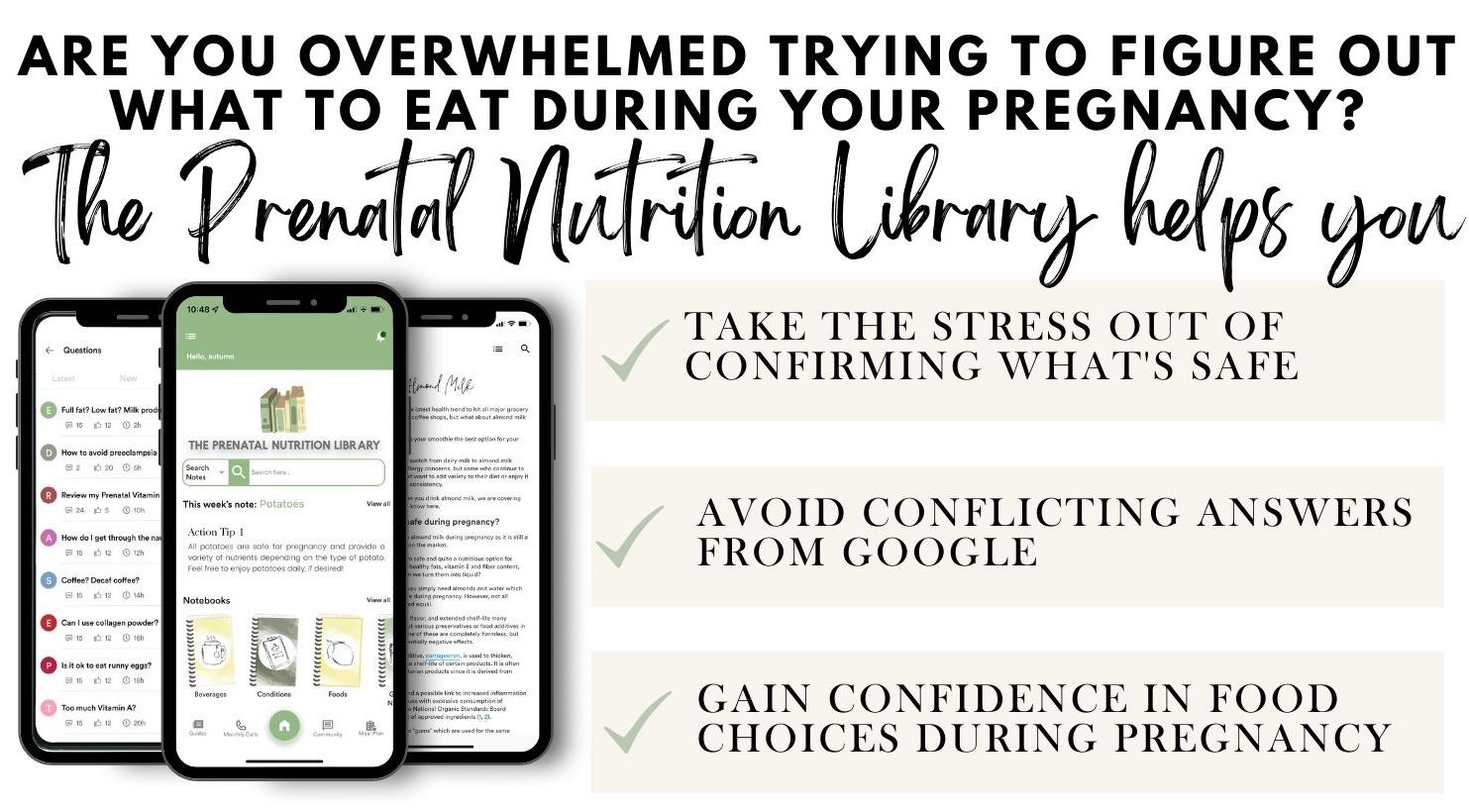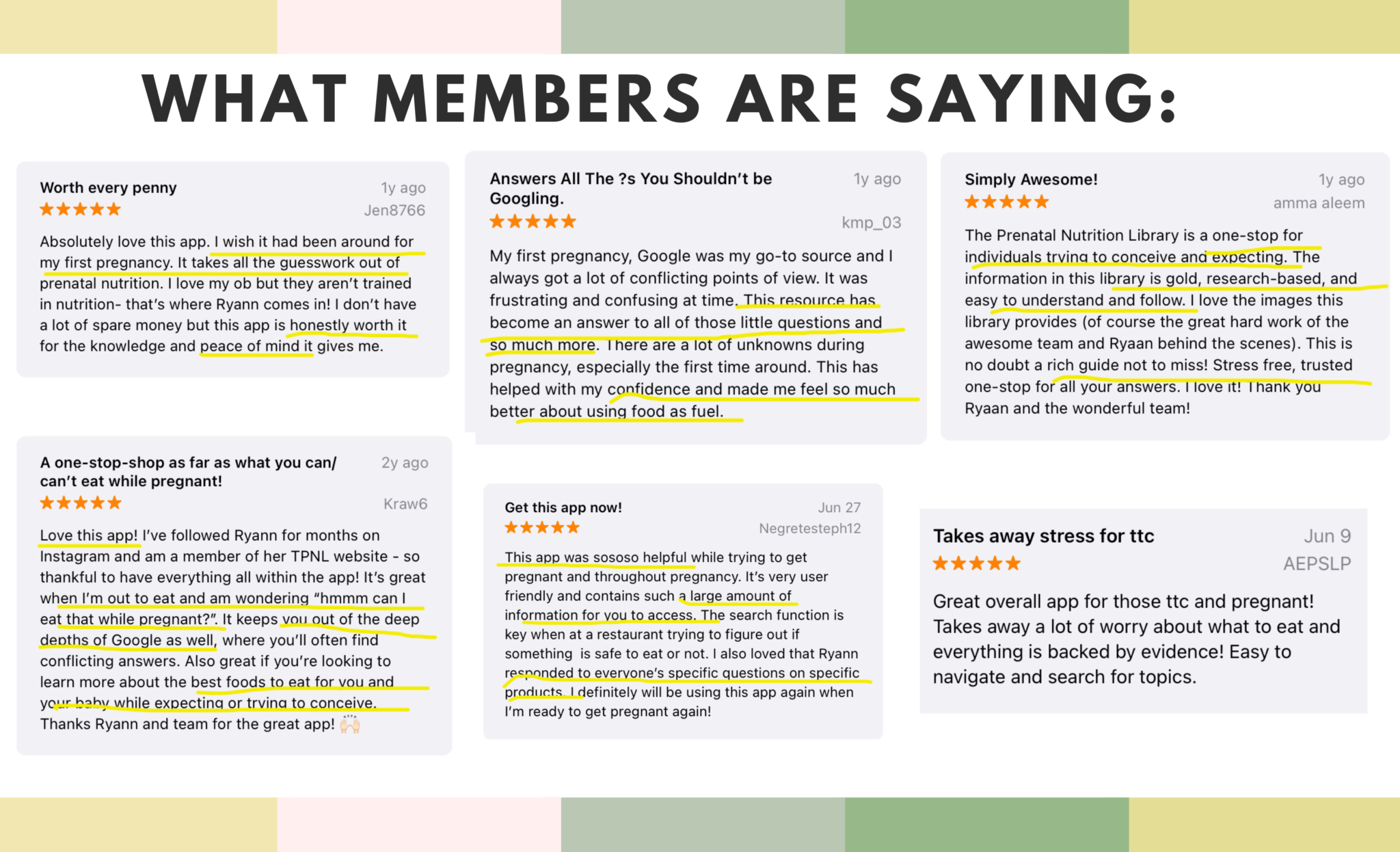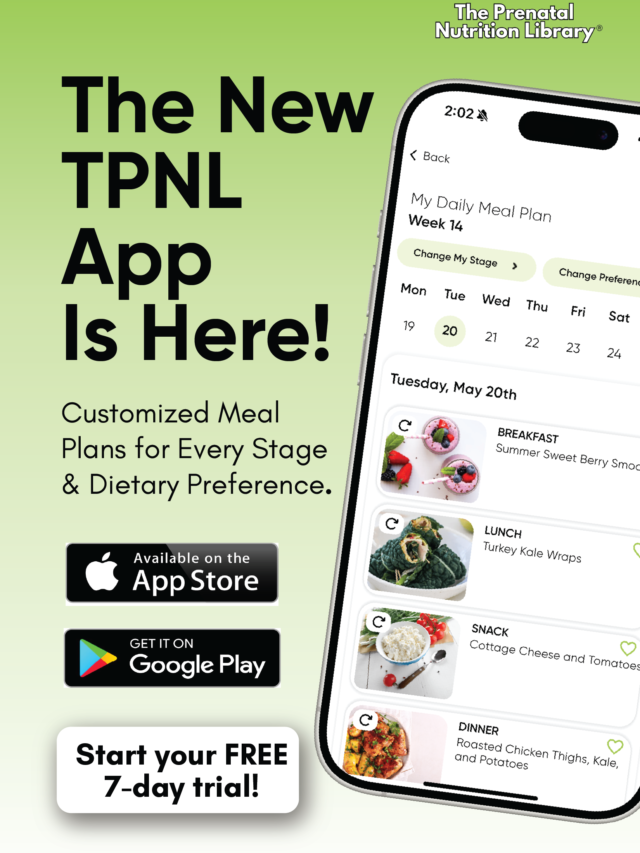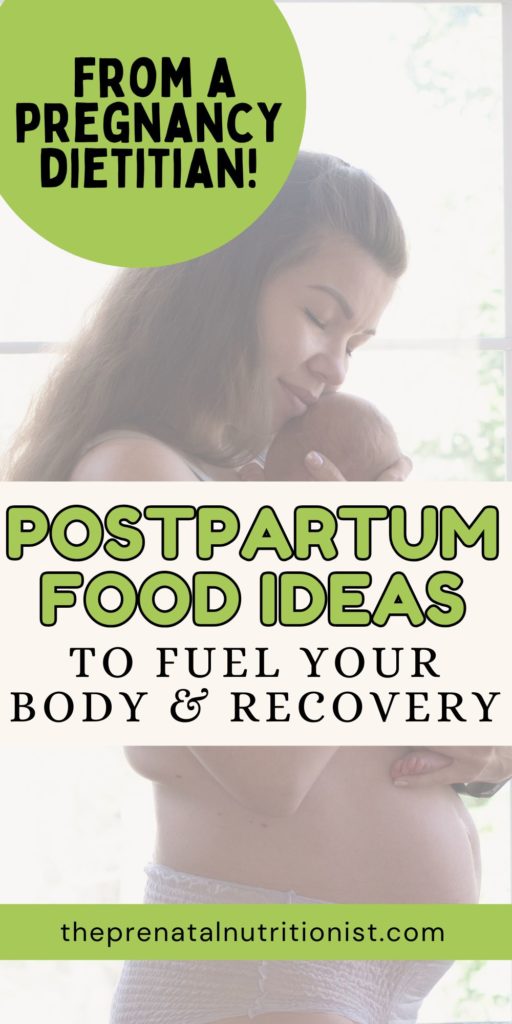
There’s no denying that the postpartum period brings a wave of physical, emotional, and hormonal changes. After giving birth, many women are surprised by just how much their body continues to go through. From uterine cramping and hormone shifts to digestion changes and sheer exhaustion, it’s a lot to navigate.
That’s why nourishing your body with the right foods can make such a big difference. Supportive postpartum nutrition can help maintain hormone balance, promote tissue repair, boost energy levels, and support breast milk production. And while it’s tempting to solely rely on takeout or meal delivery, a little planning can go a long way. Stocking your kitchen with nourishing ingredients makes it easier to fuel your body with what it truly needs during this time.
If you’re not sure where to begin, you’re not alone. Whether you’re prepping ahead of time or already in the thick of it, I’ve put together this helpful round-up of easy, nutrient-dense postpartum meal ideas. These recipes are realistic, comforting, and designed to leave you feeling supported, satisfied, and nourished in this important season of motherhood.
12 Postpartum Food Ideas To Fuel Your Body
Before diving into the meal ideas, let’s talk about what postpartum nutrition looks like. The goal isn’t to “bounce back” or chase unrealistic expectations. It’s to replenish and nourish your body. During this time, your focus should be on foods that support healing, stabilize your mood, restore nutrient stores, and, if you’re breastfeeding, help nourish your baby too.
In this post, I’ll guide you through the key nutrients your body needs after birth, how to obtain them through real foods, and which meals or ingredients are worth prioritizing. Because, let’s be honest, convenience matters. That’s why you’ll find everything from quick sides to slow cooker staples in this guide. I hope that it gives you the clarity and confidence to build a postpartum diet that feels supportive, sustainable, and doable for you.
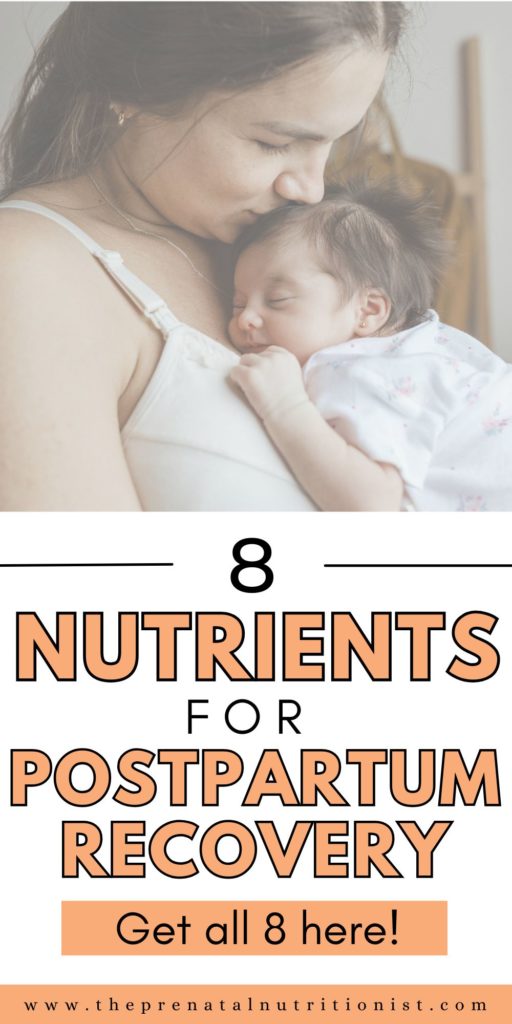
What Nutrients Do Postpartum Women Need?
Recovery after birth is no small feat. Your body is doing some serious work behind the scenes. Whether you had a vaginal delivery or a C-section, nutrient needs are elevated to support healing, hormone regulation, and daily energy demands (especially if you’re breastfeeding).
Here are several of the nutrients to focus on during the postpartum period:
Protein
Protein is essential for postpartum recovery. It supports tissue repair, helps maintain muscle mass, and stabilizes blood sugar levels. For breastfeeding moms, protein also contributes to milk production. Prioritizing protein-rich foods can help reduce postpartum fatigue and promote steady energy throughout the day. Great sources include lentils, eggs, chicken, turkey, cottage cheese, Greek yogurt, and quinoa.
Check out: “Snacks High in Protein for Pregnancy.”
Iron
Iron plays a vital role in postpartum recovery, especially after the blood loss that naturally occurs during delivery. Rebuilding your iron stores helps prevent anemia and combat fatigue. If you’re feeling unusually tired or “foggy”, low iron might be part of the reason. Nourish your body with iron-rich foods like grass-fed beef, lentils, pumpkin seeds, chicken, and liver. And don’t forget vitamin C. It boosts absorption and makes that iron work even harder for you.
Omega-3 Fatty Acids
Omega-3 Fatty Acids are powerhouse nutrients for both postpartum recovery and long-term wellness. These healthy fats support brain function, reduce inflammation, and play a key role in mood regulation. This is especially important during the emotional ups and downs of the postpartum period. If breastfeeding, omega-3s (particularly DHA) also contribute to developing your baby’s brain and nervous system. You can find omega-3s in foods like salmon, sardines, flaxseeds, chia seeds, and walnuts.
If you don’t eat fish, a supplement is highly recommended, as you won’t get enough DHA from chia seeds and walnuts. Use code RYANN at checkout for one of our favorite options!
Fiber
Postpartum digestion can be a little sluggish, to say the least. Fiber helps to ease constipation and supports gut health. It also keeps you fuller for longer and promotes steady energy levels, which are crucial in the early sleep-deprived weeks. Consider eating foods like pears, beans, oats, whole grains, avocados, and berries.
You might also like: “Fiber-Rich Foods During Pregnancy.”
Vitamin C
Vitamin C does more than support iron absorption. It’s also essential for collagen production, immune health, and tissue repair. This makes it especially valuable during postpartum recovery, when your body is healing and adjusting to new physical demands. Vitamin C-rich foods can promote wound healing, support skin and joint health, and help your body cope with the stress of healing. Excellent sources include oranges, kiwi, strawberries, broccoli, and bell peppers.
Calcium
Calcium is especially important while breastfeeding for your baby’s development and bone health. If you’re not getting enough calcium through your diet, your body will draw calcium from your bones, potentially leading to long-term depletion. Including calcium-rich foods in your daily diet helps protect your bones and maintain steady levels.
Eat sardines, yogurt, milk, cheese, tofu, and almonds.
Don’t forget to check out: “Calcium Benefits for Pregnancy.”
Zinc
Zinc is another key nutrient for postpartum healing. Like vitamin C, it supports wound healing and immune function. This could make it especially important if you had a C-section or experienced perineal tearing. Zinc also plays a role in reducing inflammation and may even support milk production.
You can find zinc in chickpeas, pumpkin seeds, beef, oats, and cashews. And yes, cashews are safe to eat during pregnancy and postpartum! (Curious? Check out “Cashews During Pregnancy: Everything You Need To Know.”).
B Vitamins
Vitamins B6 and B12 are essential for postpartum wellness, especially regarding energy, mood, and brain function. These B vitamins also support a healthy nervous system and play a role in milk production. Since your energy demands are higher during recovery and breastfeeding, getting enough B6 and B12 can make a noticeable difference in how you feel. You’ll find them in foods like eggs, dairy, meat, and nutritional yeast can help you meet your needs.
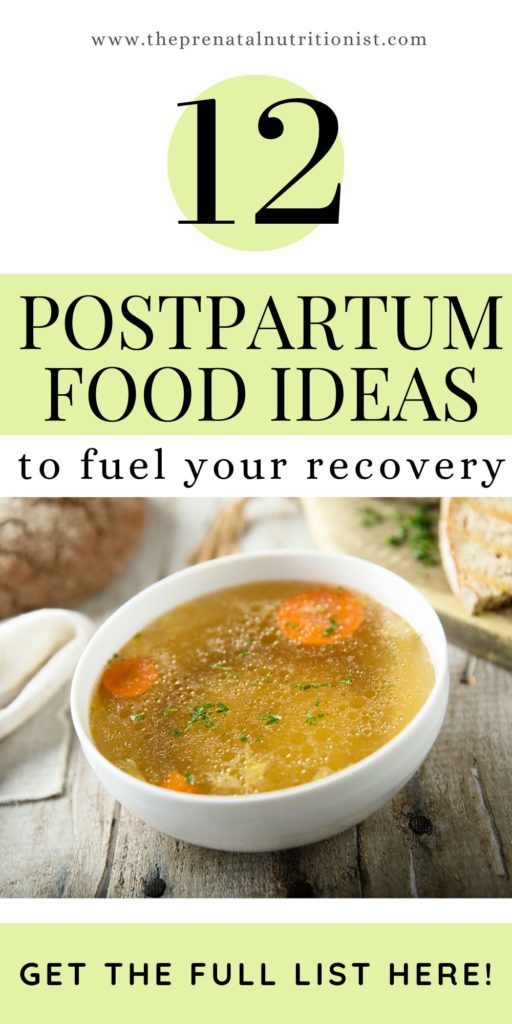
What Are The Best Foods To Eat Postpartum?
These postpartum food ideas aren’t just packed with nutrients. They’re also satisfying, comforting, and easy to prep or batch cook when recovering. Let’s dive into some of the best foods to support postpartum recovery and your breastfeeding journey.
Bone Broth
I can’t rave enough about the benefits of drinking bone broth. I love it because it’s packed with gelatin, collagen, and minerals—all things essential for your postpartum journey. This nourishing broth is warm, hydrating, and deeply comforting, making it an ideal go-to for those early days when your body needs gentle, restorative nourishment. Plus, it’s easy to make in a slow cooker and can be frozen in small portions for quick, nourishing meals whenever you need them.
Oatmeal
Oats are a fulfilling, fiber-rich option that supports digestion and regularity. They’re quick to make and easy to customize with hearty add-ins like fruit, nut butters, and seeds. Be sure to add a protein source, such as protein powder or collagen peptides, to help support balanced blood sugar levels. Check out my post on the benefits of oatmeal to see what else it’s good for.
Eggs
Eggs are a superstar food for pregnancy AND postpartum. They’re a good source of quality protein, choline, and healthy fats. Though they’re small, they’re incredibly versatile, making them ideal for quick meals or snacks. Try them boiled, scrambled, or in a veggie-packed frittata.
You might also like: “How To Eat Eggs During Pregnancy.”
Salmon
I’ve talked about the benefits of eating salmon during pregnancy, but it’s worth mentioning again, especially because many women still have concerns about mercury postpartum. The good news? Salmon is not only safe, but incredibly beneficial. It’s a rich source of protein and omega-3 fatty acids, which support hormone balance and mood stability. It’s also one of the few natural food sources of vitamin D, a nutrient that’s commonly low in postpartum women.
Pro tip: Make a little extra when you cook it. Leftovers are perfect for quick meals, such as sandwiches, wraps, or grain bowls.
Greek Yogurt
Greek yogurt is an easy snack or breakfast and is high in protein and calcium. We suggest adding berries, nuts, and seeds for an extra layer of flavor and crunch. The probiotics in Greek yogurt also support gut health, a crucial concern for postpartum women.
For more information, read “Why Is Yogurt Good For Pregnancy?” (and postpartum!).
Lentil Soup
Lentils are a postpartum powerhouse, packed with fiber, plant-based protein, and a dose of non-heme plant-based iron. A slow cooker or Instant Pot lentil soup is an easy, comforting option that checks all the boxes. Want to boost the benefits even more? Add in leafy greens, bone broth, and extra veggies for a nutrient-rich, one-pot meal that’s as satisfying as it is nourishing.
Avocado Toast
Avocados have many benefits. They are full of quality fats, potassium, magnesium, and fiber. Pair them with whole-grain bread and eggs for balanced, nutrient-dense meals. They’re also nice blended into smoothies or diced in a balanced dinner bowl.
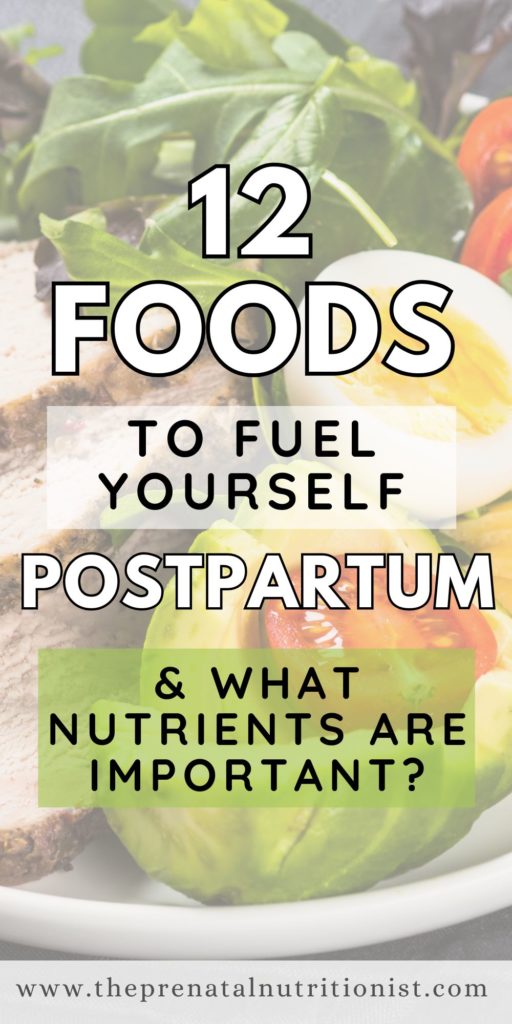
Smoothies
We all know I love a smoothie. They’re a super easy way to get veggies, fruits, proteins, and quality fats. Plus, you can drink them on the go with one hand (which moms often do).
For extra nutrition, try adding nut butter. You can also sneak in flaxseeds, oats, and leafy greens to boost your nutrient intake. If you’re searching for ideas, try out some of my favorite smoothie recipes!
Chicken and Veggie Stir Fry
A chicken and veggie stir fry is a simple, quick, and easy-to-prepare meal. Choose colorful veggies and cook with olive or coconut oil for a nourishing meal. Stir fries are also a great way to pack in protein, fiber, and antioxidants in one pan. If chicken isn’t your meat of choice, turkey or beef works great, too!
Chia Pudding
I’ve discussed the benefits of eating chia seeds while pregnant, and those benefits carry on into postpartum. Chia pudding is rich in fiber and omega-3 fatty acids, which are perfect for snacking. Prepare it in jars for grab-and-go convenience during the postpartum period, when you need something simple and easy. Add fruit, nuts, or cinnamon to boost flavor and nutrients.
Sweet Potatoes
Sweet potatoes are one of those foods that truly live up to the hype, especially in the postpartum period. Packed with fiber, complex carbohydrates, and vitamin A, they support immune function, tissue repair, and steady energy levels. Sweet potatoes are a comforting addition to any meal, naturally sweet, satisfying, and easy to digest. Bake or mash them ahead of time for a quick side dish, or use them in bowls, hashes, or even pancakes. They’re as versatile as they are nourishing.
Stews and Slow Cooker Meals
Soups, stews, and broths aren’t just comfort food—they’re also super easy to batch cook and reheat. Add bone broth, protein, and hearty veggies for a complete postpartum nutrition win. These are perfect for meal planning and staying nourished without too much effort.
Need a new go-to stew recipe? Try out my savory instant pot beef stew.
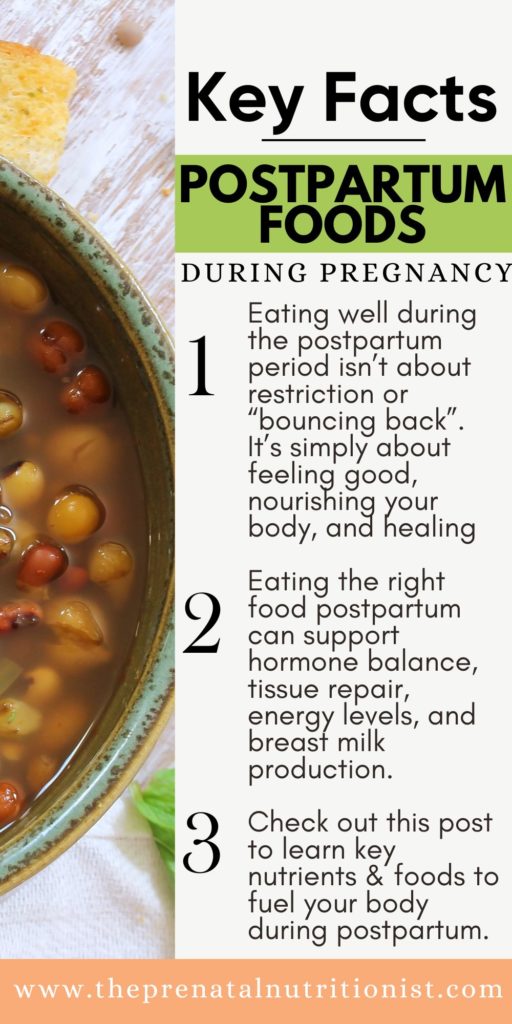
Learn exactly what to eat to support your postpartum journey when you join The Prenatal Nutrition Library!
Eating well during the postpartum period isn’t about restriction or “bouncing back.” It’s simply about feeling good, nourishing your body, and healing. Whether you’re prepping in advance or adjusting on the fly, having a list of easy, go-to foods can make the journey so much easier. What matters is supporting your breastfeeding journey, replenishing your nutrient stores, and making room for comfort food that serves your body.
You’ll love The Prenatal Nutrition Library if you need clear answers to your nutrition questions for trying to conceive, through postpartum, and breastfeeding. Make it your go-to, evidence-based resource for pregnancy and postpartum care. From preparing meals to managing cravings, you’ll have support when needed.
Don’t forget, you’ve got this! I’m here to support you every step of the way!



